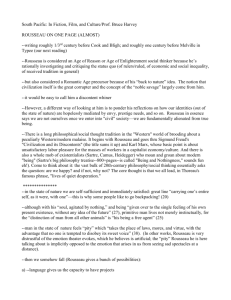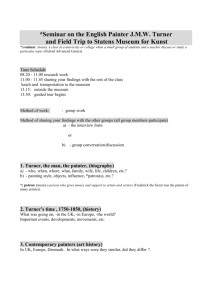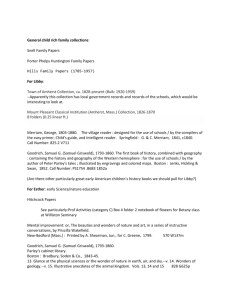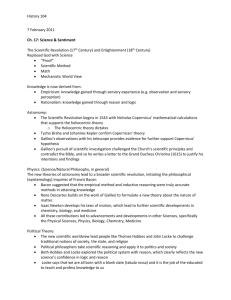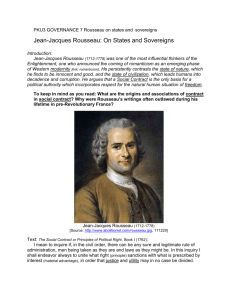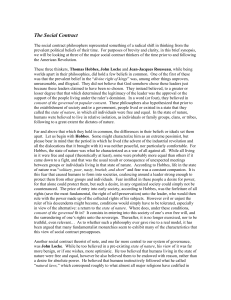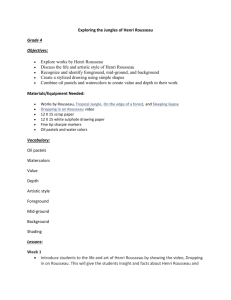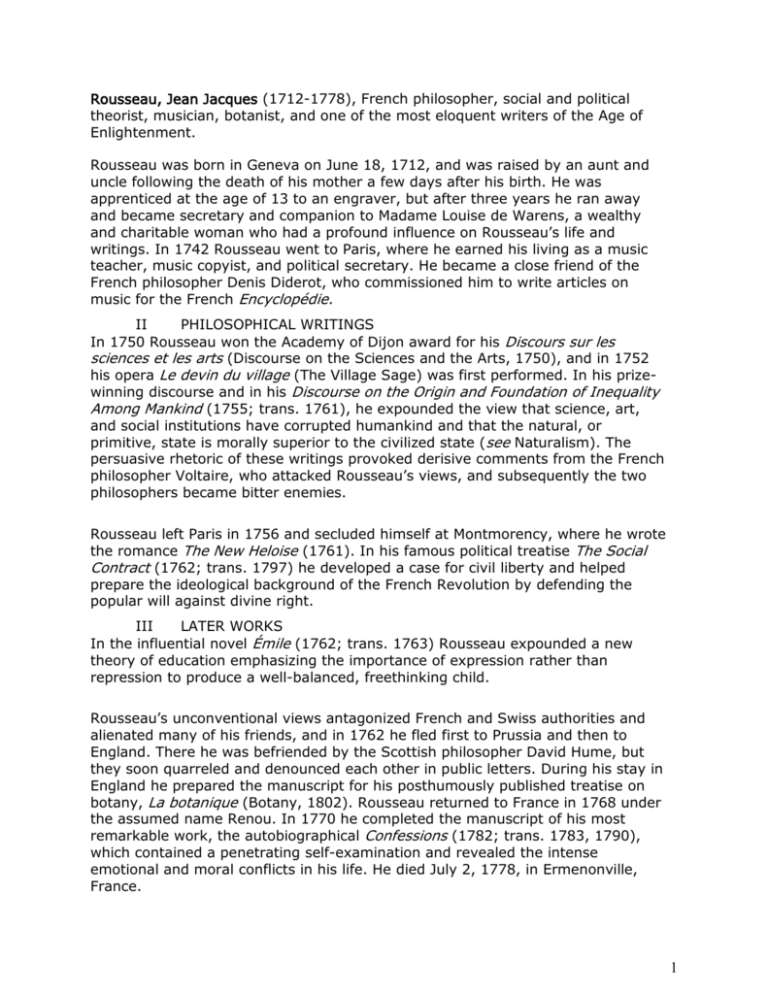
Rousseau, Jean Jacques (1712-1778), French philosopher, social and political
theorist, musician, botanist, and one of the most eloquent writers of the Age of
Enlightenment.
Rousseau was born in Geneva on June 18, 1712, and was raised by an aunt and
uncle following the death of his mother a few days after his birth. He was
apprenticed at the age of 13 to an engraver, but after three years he ran away
and became secretary and companion to Madame Louise de Warens, a wealthy
and charitable woman who had a profound influence on Rousseau’s life and
writings. In 1742 Rousseau went to Paris, where he earned his living as a music
teacher, music copyist, and political secretary. He became a close friend of the
French philosopher Denis Diderot, who commissioned him to write articles on
music for the French Encyclopédie.
II
PHILOSOPHICAL WRITINGS
In 1750 Rousseau won the Academy of Dijon award for his Discours sur les
sciences et les arts (Discourse on the Sciences and the Arts, 1750), and in 1752
his opera Le devin du village (The Village Sage) was first performed. In his prizewinning discourse and in his Discourse on the Origin and Foundation of Inequality
Among Mankind (1755; trans. 1761), he expounded the view that science, art,
and social institutions have corrupted humankind and that the natural, or
primitive, state is morally superior to the civilized state (see Naturalism). The
persuasive rhetoric of these writings provoked derisive comments from the French
philosopher Voltaire, who attacked Rousseau’s views, and subsequently the two
philosophers became bitter enemies.
Rousseau left Paris in 1756 and secluded himself at Montmorency, where he wrote
the romance The New Heloise (1761). In his famous political treatise The Social
Contract (1762; trans. 1797) he developed a case for civil liberty and helped
prepare the ideological background of the French Revolution by defending the
popular will against divine right.
III
LATER WORKS
In the influential novel Émile (1762; trans. 1763) Rousseau expounded a new
theory of education emphasizing the importance of expression rather than
repression to produce a well-balanced, freethinking child.
Rousseau’s unconventional views antagonized French and Swiss authorities and
alienated many of his friends, and in 1762 he fled first to Prussia and then to
England. There he was befriended by the Scottish philosopher David Hume, but
they soon quarreled and denounced each other in public letters. During his stay in
England he prepared the manuscript for his posthumously published treatise on
botany, La botanique (Botany, 1802). Rousseau returned to France in 1768 under
the assumed name Renou. In 1770 he completed the manuscript of his most
remarkable work, the autobiographical Confessions (1782; trans. 1783, 1790),
which contained a penetrating self-examination and revealed the intense
emotional and moral conflicts in his life. He died July 2, 1778, in Ermenonville,
France.
1
IV
INFLUENCE
Although Rousseau contributed greatly to the movement in Western Europe for
individual freedom and against the absolutism of church and state, his conception
of the state as the embodiment of the abstract will of the people and his
arguments for strict enforcement of political and religious conformity are regarded
by some historians as a source of totalitarian ideology. Rousseau’s theory of
education led to more permissive and more psychologically oriented methods of
child care, and influenced the German educator Friedrich Froebel, the Swiss
educational reformer Johann Heinrich Pestalozzi, and other pioneers of modern
education. The New Heloise and Confessions introduced a new style of extreme
emotional expression, concern with intense personal experience, and exploration
of the conflicts between moral and sensual values. In these writings Rousseau
profoundly influenced romanticism in literature and philosophy in the early 19th
century. He also affected the development of the psychological literature,
psychoanalytic theory, and philosophy of existentialism of the 20th century,
particularly in his insistence on free will, his rejection of the doctrine of original
sin, and his defense of learning through experience rather than analysis. The spirit
and ideas of Rousseau’s work stand midway between the 18th-century
Enlightenment, with its passionate defense of reason and individual rights, and
early 19th-century romanticism, which defended intense subjective experience
against rational thought.
1
1"Rousseau, Jean Jacques."Microsoft® Encarta® Encyclopedia 2001. © 1993-2000 Microsoft
Corporation. All rights reserved.
2



